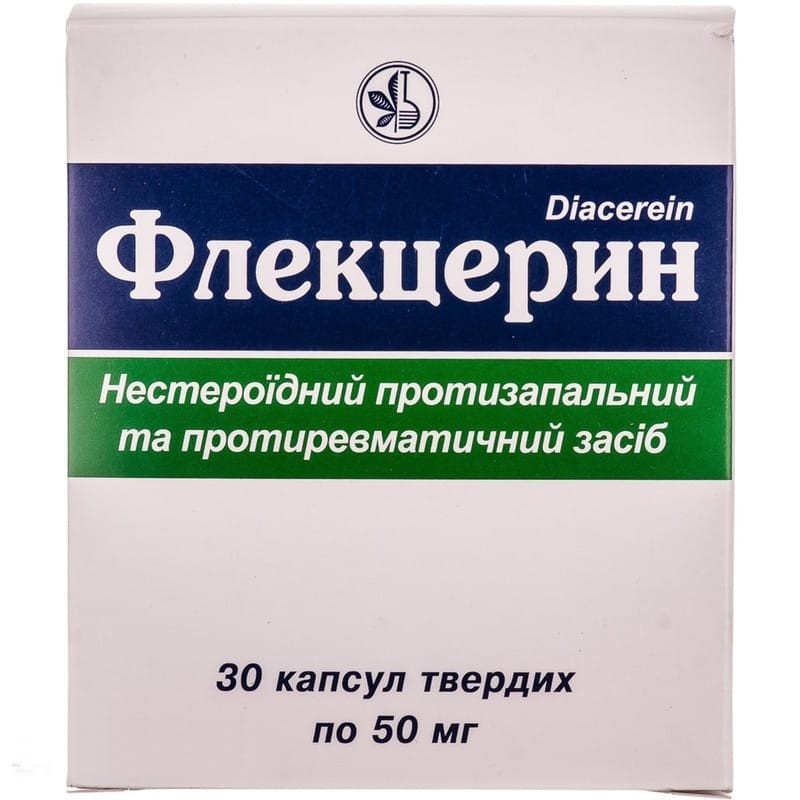



 Secure and encrypted payment processing
Secure and encrypted payment processing We ship to over 40 countries including the USA, UK, Europe, Australia and Japan
We ship to over 40 countries including the USA, UK, Europe, Australia and Japan Guaranteed refund or reship if you haven't received your order
Guaranteed refund or reship if you haven't received your orderfleckerin is a medicine for the treatment of osteoarthritis and osteoarthritis, which has analgesic, antipyretic and anti-inflammatory properties. diacerein is classified as a slow acting agent, the effect of which manifests itself within 2–4 weeks of treatment and reaches clinical significance after 4–6 weeks. It has an original mechanism of action, which differs from the mechanism of action of NSAIDs. diacerein, like its active metabolite rhein, inhibits the synthesis and activity of interleukin-1 (il-1), which plays a leading role in the pathogenesis of osteoarthritis, and at the same time increases the production of transforming growth factor-b (tgf-b), which initiates the proliferation of chondrocytes and stimulating the production of collagen ii, proteoglycans and hyaluron.
Unlike NSAIDs, diacerein does not inhibit prostaglandin synthesis and therefore does not cause gastroduodenal side effects.
Pharmacokinetics Diacerein absorption slows down when used concomitantly with food. Diacerein is completely converted to a rhein-metabolite by deacylation before entering the central blood circulation. The bioavailability of rhein metabolite is 35–56%. Distribution volume - about 13.2 liters. Rhein metabolite binds to plasma proteins by almost 99%, but this connection is not stable. Rhein-metabolite is excreted by the kidneys unchanged (20%) or conjugated in the liver to rhein-glucuronide (60%) or rhein-sulfate (20%), which are also excreted in the urine. T½ is about 7–8 hours
When using diacerein in elderly patients, no changes in its pharmacokinetic properties were noted.
Rheumatic diseases of the joints (osteoarthritis, osteoarthritis).
During the first 2–4 weeks of treatment, fleccerin is prescribed for adults in 1 capsule (50 mg) after a meal at night. starting from the 2nd – 4th week of treatment, the dose of the drug is increased to 100 mg / day in 2 divided doses (1 capsule in the morning and evening after eating). the drug is used for a long period (at least 6 months).
The duration of treatment is determined by the doctor individually.
Elderly patients. Diacerein is not recommended for patients over the age of 65 due to the fact that this category is the most vulnerable to complications associated with diarrhea.
Significant changes in pharmacokinetic parameters during the use of diacerein in elderly patients have not been established, therefore, no changes to the recommended dose are required (see PHARMACOLOGICAL PROPERTIES). Care must be taken, however. If diarrhea occurs, discontinue treatment with diacerein.
Patients with chronic renal failure. In renal failure, the pharmacokinetics of diacerein may change. In these cases, it is recommended to reduce the dose to 1 capsule per day (creatinine clearance 30 mg / ml).
Hypersensitivity to the components of the drug or anthraquinone in history. obvious or history of liver disease. inflammatory intestinal diseases (ulcerative colitis, Crohns disease). intestinal obstruction or pseudo-obstruction. abdominal pain of unknown origin. During pregnancy and breastfeeding.
Dyspeptic symptoms, diarrhea, abdominal pain that occur during the first month of treatment are possible. other side effects include increased levels of liver enzymes, intense yellow staining of urine, and allergic skin reactions (urticaria, pruritus).
Due to the late onset of action (after 2–4 weeks) during the first month of treatment with fleckerin, it can be combined with other NSAIDs and analgesics.
During therapy with diacerein, a detailed blood test, determination of liver enzymes and urinalysis should be performed periodically (1 time in 2-3 months).
Treatment with antibiotic therapy should be temporarily discontinued, since the latter can affect the intestinal flora and kinetics of the drug. Treatment with diacerein may increase the severity of symptoms of enterocolitis in patients receiving antibiotics and chemotherapy that affect the intestinal flora. Use with caution in patients with chronic renal failure.
The studies did not reveal pharmacokinetic changes in diacerein in moderate to severe cirrhosis.
When using diacerein with food, absorption of the drug is enhanced (by 24%); on the other hand, prolonged food shortages reduce the bioavailability of diacerein. Both the incidence of side effects and accelerated transit through the intestine are directly proportional to the amount of diacerein absorbed. Taking the drug on an empty stomach or after a very small amount of food can lead to the development of side effects.
The drug contains lactose, so it should not be used for hereditary galactose intolerance, Lapp lactase deficiency or impaired glucose-galactose malabsorption.
Use during pregnancy and lactation. Contraindicated.
Children. The effectiveness and safety of the drug in children have not been established, therefore, diacerein is contraindicated for use in this age group.
The ability to influence the reaction rate when driving vehicles or working with other mechanisms. There are no reports of the effect of diacerein on the ability to drive vehicles or work with other mechanisms.
Diacerein should not be taken concomitantly with drugs that alter the passage of intestinal contents, or with fibers of plant origin. it is necessary to avoid the simultaneous use of preparations containing aluminum and magnesium hydroxide, as this can affect the absorption of diacerein.
The synergistic effect of diacerein with NSAIDs and non-narcotic analgesics has been established.
Fleckerin should not be used simultaneously with chemotherapy or antibiotics that affect the intestinal flora, as well as with laxative drugs.
If you accidentally or intentionally take high doses of diacerein, diarrhea can occur. there is no specific antidote. emergency therapy is to restore electrolyte balance.
In the original packaging at a temperature not exceeding 25 ° C.